Kategorie: ‘Romania’
Internship in Romania
- Chemistry M.Sc.
- Romania, Bucharest
- National University of Science and Technology Politehnica Bucharest
- 09/2023 – 11/2023
Application & Search for an internship
Romania is home of many inventors and known for its research in many scientifical fields. I am studying chemistry, so naturally I wanted to get to know and experience
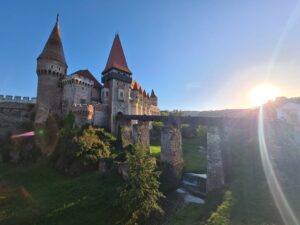
Corvin’s Castle
© Andreea Maria Rânea
the scientifical research in the capital, Bucharest. Since I went for a two-month research internship, the process of applying was different and simpler than going for lectures. I searched for scientific topics of interest and started first looking at University Politehnica of Bucharest, as it has a good reputation. This is how I came across the National Center of Micro and Nanomaterials. My application was done three months in advance, directly to the director of the center, who happily accepted me. As for the bureaucracy, I only had one formular to fill out for my internship to be recognized at RWTH. Romania is part of the European Union, so no visa is required, and if you have a German health insurance, your stay is covered under the European Health Card.
Accommodation & Living Expenses
The University offers all students a place in the dorms, which are near the main campus. In the rectorate, located in the main campus, there is a cafeteria on the top floor (on the terrace) with a look over the campus and with fresh traditional Romanian food. The price of a full meal was around 3 Euros, and you could also have traditional soup for 1.4 Euros. Alternatively, the biggest mall, Afi Palace Cotroceni, is situated 10 minutes on foot from campus, so the possibility of eating at different restaurants can also be taken into consideration.
The University is easily accessible- you can take either the metro, buses, or tram to the University gate. There is a common card which you can use for all these transportation means and the metro fare for example was 1 euro/ 2 trips.
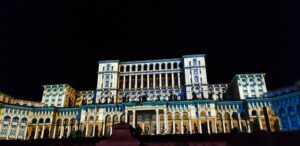
Palace of the Parliament (under light show)
© Andreea Maria Rânea
Groceries are also relatively cheap, so if you wish to cook for yourself, you can find high quality bio vegetables and meat which you can buy directly from the producer. There are many weekly markets with producers from all over the country too.
Everyday life/ Internship
Romanians are generally very welcoming people and usually make it their mission to include new people and make them feel at home. I could feel that especially in my laboratory, where every member would constantly come to me, ask me my progress, if I have any difficulties, if I want to grab lunch together, the list goes on. Even some of them with different expertise and research than mine would sit down with me and brainstorm reasons to explain my results when I needed help. Furthermore, as we sat down one day with the director and another professor, we got to hear stories about their youth and university time, which was quite different from university today. I was surprised to also hear stories about Romanian chemistry figures like Costin Nenițescu and get so familiar with those times. I think it was very nice to befriend the professors and other members like that, instead of only keeping a distanced professional relationship. Going to the laboratory daily felt warm and welcoming.
After I got my safety and general introductions of the laboratory, I could start to work right away. My research was on the synthesis and doping of hydroxyapatite for medical applications. For this synthesis I first used a microwave assisted reactor for hydrothermal method. I also got to personally use the X-Ray Diffraction spectrometer and assist experts for the Scanning and Transmission Electron Spectroscopy. The laboratory was equipped with new generation devices for the best analysis results, as well as all necessary materials for my research. I also got to work again with cells for viability and cytotoxicity tests since my bachelor’s thesis. The bio-safety laboratory was placed in a new building, also on the main campus. From
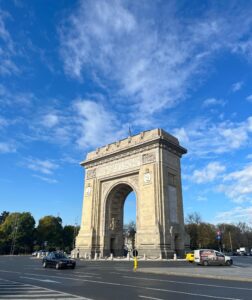
The Triumphal Arch Bucharest
© Andreea Maria Rânea
September to November there was very good weather in Bucharest, with temperatures even exceeding 30 degrees Celsius at times, so the walk through the campus between the buildings was a nice change of scenery during work. With the start of the semester in October it got livelier, also since most students spend their breaks outside (the line in the cafeteria got longer too unfortunately). Another endearing fact was that the group had three aquariums with fish and turtles in the common room, which personally lifted my spirit every day, as the turtles would always come forth to greet you.
During my time there, I was invited to join the Conference of the Romanian Electron Microscopy Society which was held in Cluj-Napoca. This conference was attended by many Romanian and foreign electron microscopy specialists, as well as well-known electron microscope producers like Zeiss, Jeol and Thermo Fisher Scientific. It was a great experience for me, as it was the first scientifical conference of this type that I attended, and it gave me meaningful insights for my future career. Furthermore, I had the opportunity to attend three PhD thesis defenses, also a first for me. The tradition there was that after the presentation, the new doctor would organize a catering for the group to celebrate. There were also a lot of emotions involved and praises coming from the jury, which was formed interdisciplinary, with professors from chemical and medical faculties.
Free Time & Tips
Outside the laboratory I would generally meet friends and walk through the city. We would go down the Victoriei Boulevard and grab some ice cream at one of the best shops I visited (Gelateria La Romana) and then enjoy the George Enescu classical music festival in front of the Royal Palace. Another beautiful sight was the Palace of the Parliament, which is the second largest administrative building after the Pentagon, as well as the heaviest building in the world. The materials used for its construction are almost entirely of Romanian origin, with thousands of tons of crystal and millions m3 of marble, wood, and woolen carpets, as well as velvet and brocade curtains with silver and gold embroideries.
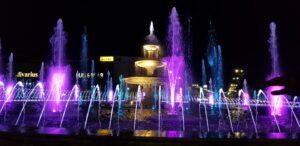
Unirii Square Fountains
© Andreea Maria Rânea
The streets were always full until late, as the shops and restaurants close at 10 PM or later. On Sunday all facilities are open as usual, and you can always find a non-stop shop or even pharmacy. The Old City (Centrul Vechi/ Lipscani) is a glimpse of the old streets of Bucharest, which kept the old buildings and churches as well and is well known as an entertainment center, being home to various restaurants, bars, and clubs. A restaurant that you must visit while in Bucharest is “Caru’ cu Bere”, traditionally decorated and which offers traditional live music as well as traditional dance performances every day. If you are unsure what to order, some typical traditional dishes are “Mici/ Mititei”, “Sarmale”, “Ciorbă de burtă”, “Mămăligă (Polenta) with sour cream and cheese” and “Ardei umpluți”. I also recommend you make a reservation beforehand, if possible, as it is usually very busy. Besides the varied nightlife there are a lot of activities that you can do. Theater is also famous in the Romanian culture, and there are many theaters in Bucharest. I also got to see in premiere the piece “The Envelope” written by famous Romanian novelist Liviu Rebreanu. After the laboratory I would also go to the Dinamo Stadium for track and field training.
On the weekend I traveled to the mountains, to cities like Brașov and Bran, which is known for Dracula’s castle, the Bran castle. Dracula as known today was ins
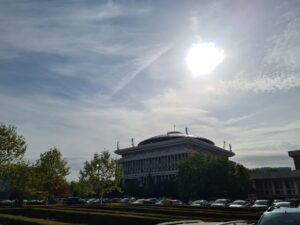
University Politehnica of Bucharest
© Andreea Maria Rânea
pired by Vlad III Voivode of Wallachia, also known as Vlad the Impaler or Vlad Drăculea (Dracula), his first nickname being related to his execution method and the second being his name in the Order of the Dragon. Finally, there were a lot of historical buildings and sites with a lot of stories to tell throughout Romania.
It is important to note that Romania has one of the biggest brown bear populations in Europe, and if you travel to the mountains, you might come across them. If you plan to go on a hike, you must pay attention to the signs and follow the set paths. Also, if you choose a hotel situated in or near the forest, you will get warned by the staff not to walk outside during the night, as you might just encounter one. Sometimes you get to see them from your window too, or on the side of the serpentines, just minding their own business.
In Poiana Brașov you can find two of the best traditional Romanian restaurants, which I totally recommend if you ever visit there.
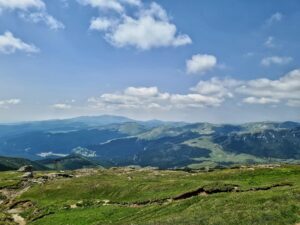
Bucegi Mountains
© Andreea Maria Rânea
These are „Stâna Turistică Serghiana” and „Coliba Haiducilor”. Each has a different charm, and both have traditional live music and decorations. For the first one I recommend to eat outside, at the highest level for the best view, and for the second one inside, for the best atmosphere.
As I said before, Romanians are very welcoming, and you can notice this anywhere you go. Even if you don’t speak the language, the majority of Romanians can speak fluent English and usually other languages as well, like German, Italian, French and Spanish, Romanian also being a latin language.
Conclusion
In conclusion, my research at University Politehnica of Bucharest was a valuable experience for me personally as well as academically and offered me important insights to consider for my future career. Also, there are a lot of stories I could tell about my time there, as my experiences were very varied. The atmosphere is generally very warm and relaxed, and if you plan your research well, you won’t feel too pressured or overwhelmed. I am grateful for being supported during my internship by the Erasmus+ grant and to represent RWTH Aachen University and I definitely recommend a stay abroad in Bucharest as I had a wonderful time there.

